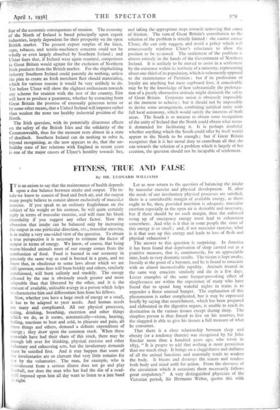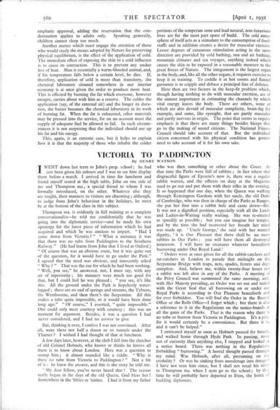FITNESS, TRUE AND FALSE
By DR. LEONARD WILLIAMS
IT is an axiom to say that the maintenance of health depends upon a due balance between intake and output. The in- take we know to consist of food and fresh air, and the output many people believe to consist almost exclusively of muscular exercise. If you speak to an ordinary Englishman on the subject of his weight or his contour, he will quite certainly reply in terms of muscular exercise, and will stare his blank incredulity if you suggest any other factor. Now the obsession that intake can be balanced only by increasing the output in one particular direction, viz., muscular exercise, is in reality a very one-sided view of the question. To obtain a true perspective it is necessary to estimate the factor of output in terms of energy. We know, of course, that being warm-blooded animals most of our energy comes from the combustion of food. Food is burned in our economy in precisely the same way as coal is burned in a grate, and we know that, in obedience to some laws about which we are still ignorant, some fires will burn briskly and others, similarly conditioned, will burn sullenly and smokily. The energy released by the one is obviously much greater and more adaptable than that liberated by the other, and it is the amount of available, utilisable energy in a person which helps to characterise him and differentiate him from his fellows.
Now, whether you have a large stock of energy or a small, it has to be adapted to your needs. And human needs are many and complicated. All our physical processes, eating, drinking, breathing, excretion and other things which we do, as it seems, automatically—vision, hearing, feeling, reactions to heat and cold, to pleasure and pain, all these things and others, demand a definite expenditure of energy ; they draw upon the common stock. When these essentials have had their share of this stock, there may be enough left over for thinking, physical exercise and other voluntary and exhausting acts, but the involuntary demands must be satisfied first. And it may happen that some of the involuntaries are so clamant that very little remains for use by the voluntaries. The man, for example, who is convalescent from a serious illness does not go and play football, nor does the man who has had the din of a road- drill imposed upon him all day want to listen to a jazz band at night. Let us now return to the question of balancing the intake by muscular exercise and physical development. If, after the needs of our involuntary physical processes are satisfied, there is a considerable margin of available energy, as there ought to be, then, provided nutrition is adequate, muscular exertion especially in the open air is desirable and necessary, but if there should be no such margin, then the enforced using up of emergency energy must lead to exhaustion somewhere. And why is it that in some people the store of this energy is so small ; and, if not muscular exercise, what is it that uses up this energy and leads to loss of flesh and physical exhaustion ?
The answer to this question is surprising. In America it has been found that deprivation of sleep carried out as a punitive measure, that is, continuously, for an appreciable time, leads to very dramatic results. The victim is kept awake, literally at the point of a bayonet, and he is found to emaciate with an almost inconceivable rapidity. Animals treated in the same way emaciate similarly and die in a few days. Lesser examples of the same hunger-provoking effect of sleeplessness are within the experience of many who have found that to spend long wakeful nights in trains is to engender a fierce unusual hunger. The explanation of this phenomenon is rather complicated, but it may be expressed briefly by saying that nourishment, which has been prepared and elaborated in the digestive organs, is unable to reach its destination in the various tissues except during sleep. The sleepless person is thus forced to live on his reserves, but the sluggard is able to give his tissues a full measure of what he consumes.
That there is a close relationship between sleep and obesity (or a tendency thereto) was recognised by Sir John Sinclair more than a hundred years ago, who wrote in 1833, " It is proper to add that nothing is more pernicious than too much sleep. It brings on a sluggishness and dullness of all the animal functions and materially tends to weaken the body. It blunts and destroys the senses and renders both body and mind unfit for action. From the slowness of the circulation which it occasions there necessarily follows great corpulency." A very distinguished physician of the Victorian period, Sir Hermann Weber, quotes this with emphatic approval, adding the reservation that the con- demnation applies to adults only. Speaking generally, children cannot sleep too much.
Another matter which must engage the attention of those who would study the means adopted by Nature for preserving physical equilibrium, is the effect of the application of cold. The immediate effect of exposing the skin to a cold influence is to cause its contraction. This is to prevent any undue loss of heat. Man is essentially a warm-blooded animal, and, if his temperature falls below a certain level, he dies. If, therefore, application of cold is more than transitory, the chemical laboratory situated somewhere in our interior economy is at once given the order to produce more heat. This is effected by burning the fat which everyone, however meagre, carries about with him as a reserve. The colder the application (say, of the external air) and the longer its dura- tion, the busier becomes the chemical laboratory in its work of burning fat. When the fat is exhausted, other materials may be pressed into the service, for on no account must the supply of adequate fuel be allowed to fail. In such circum- stances it is not surprising that the individual should use up his fat and his energy.
This, again, is an extreme case, but it helps to explain how it is that the majority of those who inhabit the colder portions of the temperate zone and lead natural, non-luxurious lives are for the most part spare of build. The cold atmo- sphere of itself acts as a stimulant to the consumption of food- stuffs and in addition creates a desire for muscular exercise. Lesser degrees of cutaneous stimulation acting in the same direction are provided by cold bathing, sun and air bathing, mountain climates and sea voyages, anything indeed which causes the skin to be exposed in a reasonable measure to the great forces of Nature. The integument is the largest organ in the body, and, like all the other organs, it requires exercise to keep it in training. To coddle it in hot rooms and flannel garments is to cripple and debase a principal line of defence.
Here then are two factors in the keep-fit problem which, though having nothing to do with muscular exertion, are of the utmost importance in estimating the channels by which vital energy leaves the body. There are others, some of which are also devoid of muscular complicity, brain-fag for example, and some, like eyesight, that are partly muscular and partly nervous in origin. The point that seems to require emphasis is that there are many things besides biceps that go to the making of sound citizens. The National Fitness Council should take account of that. But the individual citizen concerned with his physical condition has greater need to take account of it for his own sake.















































 Previous page
Previous page